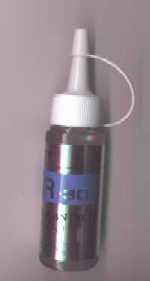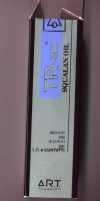[ TNT | Who we are | Listening tests | HiFi Shows | HiFi topics | Tweakings | Inter.Views ]
C30H62: ART T-30 multipurpose oil for HiFi
[Italian version]
Product: TR-30 - Squalan Oil
Manufacturer: A.R.T. Audio Reference
Technology - Italy
Approx. price: 50 $/bottle


In 1906 dr. Tsujimoto started to study a strange kind of shark known under the scientific name Centrophorus artomarginatus which lived in the depths of the pacific Ocean at -1000 meters under the sea level, surving without trouble at so high pressures and temperatures as low as -55° C, with so little oxygen and sunlight.
The scientific interest was mainly focused on the ability of this shark to survive at such extreme living conditions. In 1930 the researchers discovered that this shark was surprisingly immune from any kind of known cancer.
They discovered that this interesting feature was closely linked to the presence, into the liver of the shark, of a kind of oil that produces oxygen once it has a contact with water and that becomes a vector for oxygen through the body of the shark.
This was called the Squalan Oil and its chemical formula reads as C30H62.
Both the cosmetic and pharmaceutical industry started to use this oil thanks to its
ability to penetrate into the first layers of the human skin, bringing oxygen to them. A Japanese Company even sells it as an anti-tumoral medicine.
The A.R.T. in Florence, Italy, proposes it as a cleaning oil for contacts and vinyl LPs.
The product
The package is very elegant, as you may see in the picture above and it contains a 50 ml bottle of this strange oil which is completely transparent and odourless,
electrically non-conductive and perfectly skin-compatible (so it is not that kind of contact cleaners which can be dangerous to touch and toxic...).
The box contains a very detailed owner's manual and a small teflon RCA pin that can be used to distribute the oil INSIDE the RCA sockets, even till the hardest-to-reach zones.
Contact cleaning with the TR-30
The first test has been the easier one: put some drops of TR-30 oil on the RCA sockets, then, after few minutes, plug in the teflon pin and rotate it into the socket. At the end of it all your RCA sockets are brilliant as they were new and the teflon pin is completely dirty and needs to be washed with water and soap.
Honestly I admit I haven't been able to hear any audible difference. Anyway it is a pleasure to know that all that dirt has been taken away from your precious gold pins so that the signal trasfer is virtually perfect.
Cleaning tubes pins
With the aid of tiny pieces of cotton I've cleaned the tubes pins of my tube amp. It has been a long and tiring procedure...once finished, I was ready to listen to the effects on the sound of my beloved amp. This time I could clearly hear a difference: the high range was cleaner and more refined, even too much, considering my already *bright* set-up. Anyway, the oil works and it allows for a better signal transfer, especially in the high range.
Cleaning those LPs
Just ten drops of TR-30 over the LP surface are sufficient for the treatment. Spread the oil with your fingers, wait a couple of minutes and then wipe the surface dry with the aid of a soft cloth. The LP is not ready for the first listening yet: just make it play once so that the stylus can take away any oil and dirt excess into the grooves.
If your LPs are dirty the stylus can be so easily covered with dirt and oil that it can't play the entire record. Clean the stylus and play it again, Sam!
Now it's time to switch to phono and listen. WOW! The signal/noise ratio increases dramatically, the details come out of the grooves with ease, the sound becomes more airy and refined and even the bass range becomes cleaner and better articulated.
This stuff works!
Conclusions
We're talking of tiny differences here and this oil doesn't come cheap. But, if you consider that with a 50 ml bottle you can treat and clean 100 LPs and protect for a whole year all the electrical contacts of your HiFi set-up, the thing becomes quite interesting and convenient. I'd say a must, indeed.
© Copyright 1999 Mimmo Cacciapaglia
How to print this article
[ TNT | Who we are | Listening tests | HiFi Shows | HiFi topics | Tweakings | Inter.Views ]



